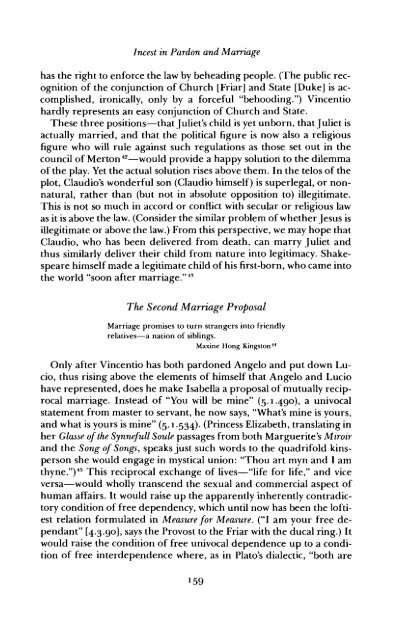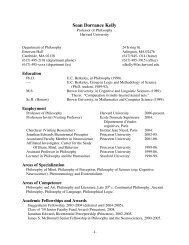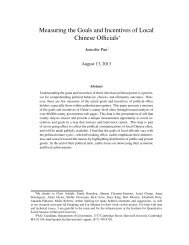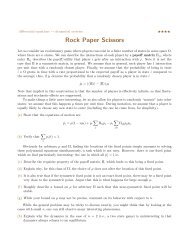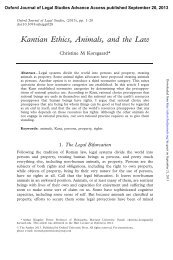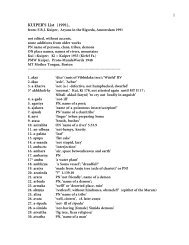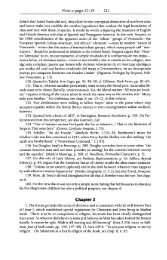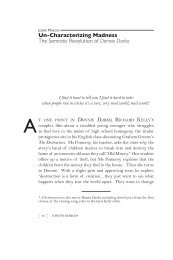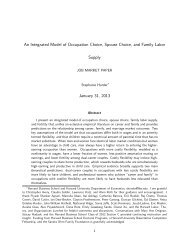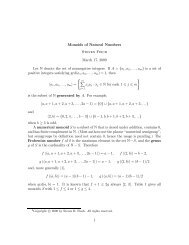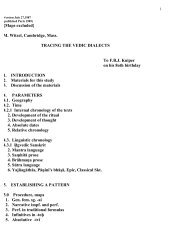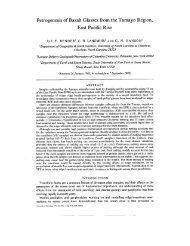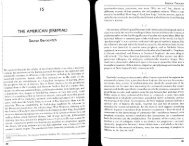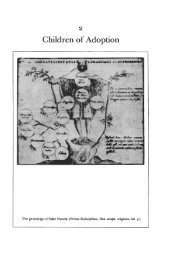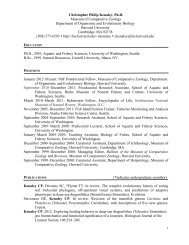Incest in Pardon and Marriage - People Fas Harvard
Incest in Pardon and Marriage - People Fas Harvard
Incest in Pardon and Marriage - People Fas Harvard
Create successful ePaper yourself
Turn your PDF publications into a flip-book with our unique Google optimized e-Paper software.
<strong>Incest</strong> <strong>in</strong> <strong>Pardon</strong> <strong>and</strong> <strong>Marriage</strong><br />
has the right to enforce the law by behead<strong>in</strong>g people. (The public recognition<br />
of the conjunction of Church [Friar] <strong>and</strong> State [Duke] is accomplished,<br />
ironically, only by a forceful "behood<strong>in</strong>g.") V<strong>in</strong>centio<br />
hardly represents an easy conjunction of Church <strong>and</strong> State.<br />
These three positions-that Juliet's child is yet unborn, that Juliet is<br />
actually married, <strong>and</strong> that the political figure is now also a religious<br />
figure who will rule aga<strong>in</strong>st such regulations as those set out <strong>in</strong> the<br />
council of Mert~n~~-would provide a happy solution to the dilemma<br />
of the play. Yet the actual solution rises above them. In the telos of the<br />
plot, Claudio's wonderful son (Claudio himself) is superlegal, or nonnatural,<br />
rather than (but not <strong>in</strong> absolute opposition to) illegitimate.<br />
'This is not so much <strong>in</strong> accord or conflict with secular or religious law<br />
as it is above the law. (Consider the similar problem of whether Jesus is<br />
illegitimate or above the law.) From this perspective, we may hope that<br />
Claudio, who has been delivered from death, can marry Juliet <strong>and</strong><br />
thus similarly deliver their child from nature <strong>in</strong>to legitimacy. Shakespeare<br />
himself made a legitimate child of his first-born, who came <strong>in</strong>to<br />
the world "soon after marriage."43<br />
The Second <strong>Marriage</strong> Proposal<br />
<strong>Marriage</strong> promises to turn strangers <strong>in</strong>to friendly<br />
relatives-a nation of sibl<strong>in</strong>gs.<br />
Max<strong>in</strong>e Hong K<strong>in</strong>g~ton~~<br />
Only after V<strong>in</strong>centio has both pardoned Angelo <strong>and</strong> put down Lucio,<br />
thus ris<strong>in</strong>g above the elements of himself that Angelo <strong>and</strong> Lucio<br />
have represented, does he make Isabella a proposal of mutually reciprocal<br />
marriage. Instead of "You will be m<strong>in</strong>e" (5.1.490)~ a univocal<br />
statement from master to servant, he now says, "What's m<strong>in</strong>e is yours,<br />
<strong>and</strong> what is yours is m<strong>in</strong>e" (5.1.534). (Pr<strong>in</strong>cess Elizabeth, translat<strong>in</strong>g <strong>in</strong><br />
her Glasse of the Synnefull Soule passages from both Marguerite's Miroir<br />
<strong>and</strong> the Song of Songs, speaks just such words to the quadrifold k<strong>in</strong>sperson<br />
she would engage <strong>in</strong> mystical union: "Thou art myn <strong>and</strong> I am<br />
th~ne.")~' This reciprocal exchange of lives-"life for life," <strong>and</strong> vice<br />
versa-would wholly transcend the sexual <strong>and</strong> commercial aspect of<br />
human affairs. It would raise up the apparently <strong>in</strong>herently contradictory<br />
condition of free dependency, which until now has been the loftiest<br />
relation formulated <strong>in</strong> Measure for Measure. ("I am your free dependant"<br />
[4.3.90], says the Provost to the Friar with the ducal r<strong>in</strong>g.) It<br />
would raise the condition of free univocal dependence up to a condition<br />
of free <strong>in</strong>terdependence where, as <strong>in</strong> Plato's dialectic, "both are


